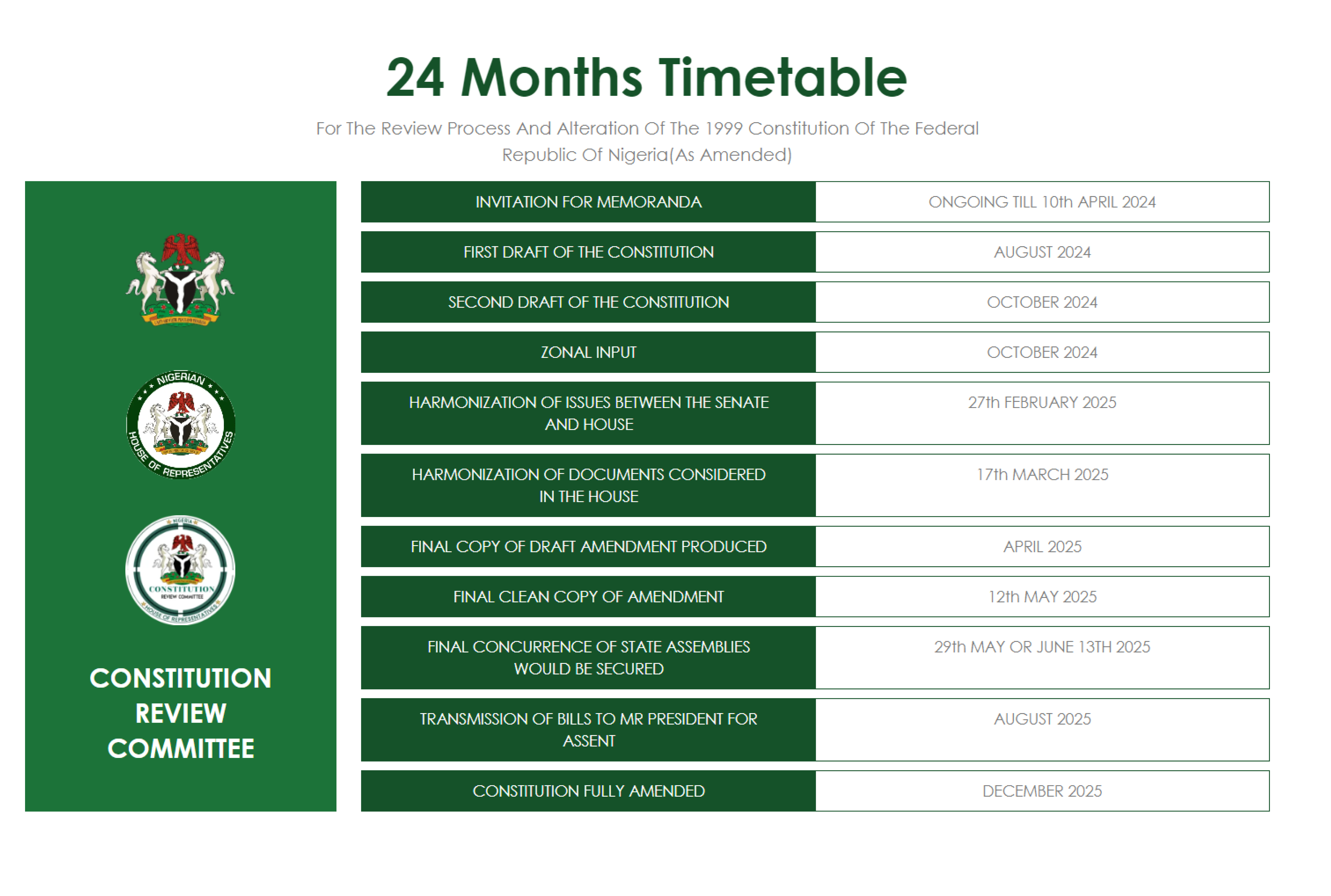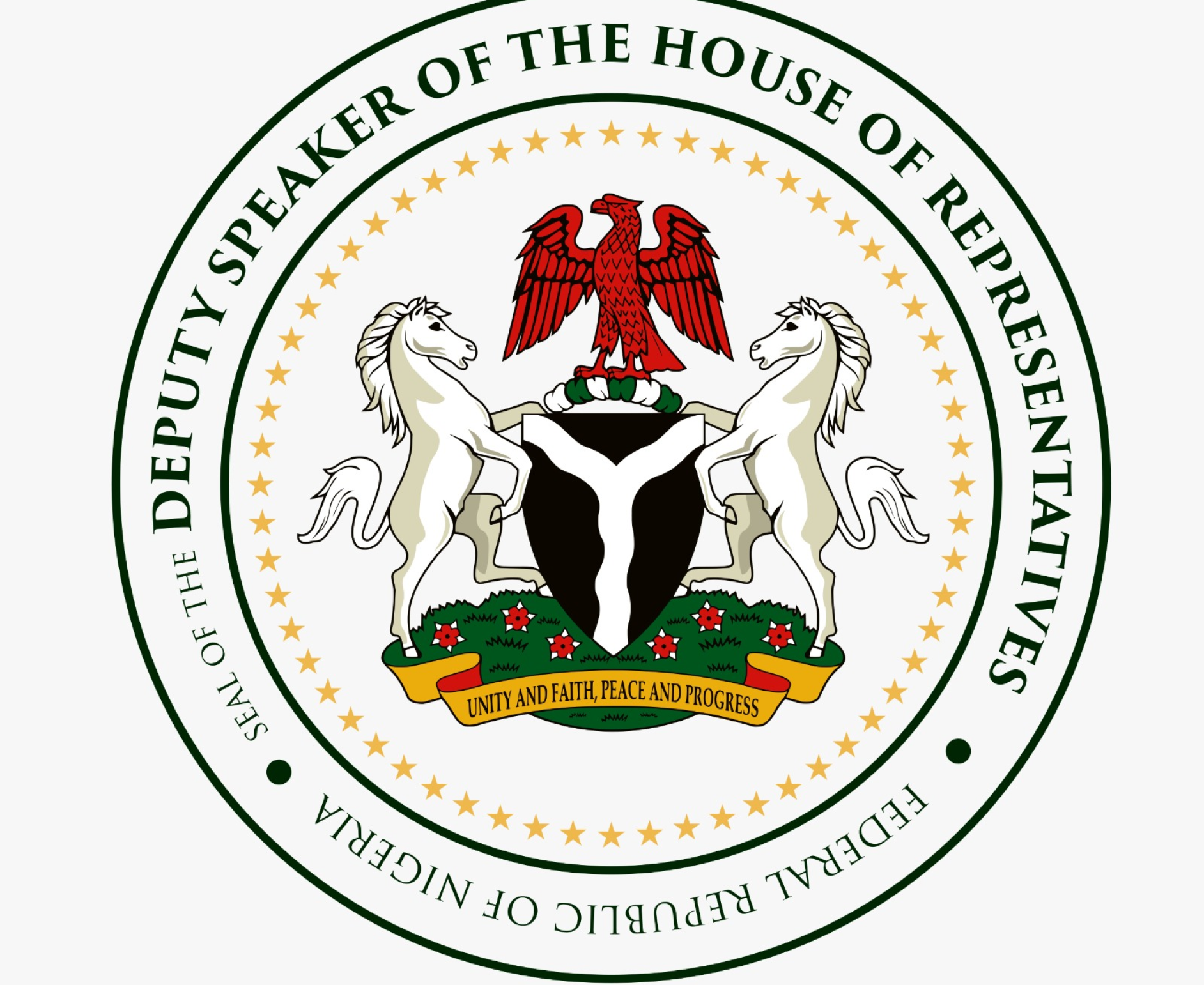Follow the Constitution Review Process of the 10th House of Representatives
Amid calls for restructuring, and sitting as Chair of the House Committee on Constitution Review, Rep. Kalu leads the way for the 10th House of Reps as it charts the course for Nigeria’s next constitutional amendment.

Constitution Review
The House of Representatives Committee on the Review of the Constitution of the Federal Republic of Nigeria, 1999 (As Amended) was established pursuant to Section 62 of the Constitution of the Federal Republic of Nigeria, 1999 (As Amended) and Order 18 (9) of the Standing Orders of the House of Representatives. It is a special committee charged with the following responsibilities:
- Recommending the alteration of the Constitution of the Federal Republic of Nigeria 1999 and other Acts that require alteration in accordance with sections 8 and 9 of the Constitution;
- Receiving and considering proposals (bills) for alteration of the 1999 Constitution (As Amended) referred to it by the House;
- Creating a forum for relevant stakeholders and members of the public to make inputs to the Constitution review process with a view to enacting laws that address the needs and aspirations of the Nigerian people;
- Building a robust collaborative synergy with the Senate of the Federal Republic of Nigeria and with the 36 States Houses of Assembly whose resolutions are part of the legislative journey of the constitution review process;
- Liaising with relevant government agencies, civil society organisations, multi-lateral and supranational agencies and bodies to achieve a wholesome amendment to the Nigerian constitution.

History Of The Nigerian Constitutional Development
Colonial - Constitution of the Colony and Protectorate of Nigeria
Amalgamated the Colony and Protectorate of Southern Nigeria and the Protectorate of Northern Nigeria, into a single colony
1914
Colonial - The Hugh Clifford Constitution
In 1919, pressured by the West African Congress, Governor Sir Hugh Clifford introduced the Clifford Constitution of 1922, which established Nigeria's first electoral system with limited franchise based on a high income requirement. It created a legislative council of 46 members, mostly officials, with limited legislative power restricted to the South. The executive council included no Nigerians. Subsequent governors, Cameroon and Bernard Boudillion, made minimal constitutional changes but divided Nigeria into East, West, and North, laying the foundation for future regionalism.
1922
Colonial - Arthur Richards Constitution
In late 1944, Governor Sir Arthur Richards introduced a new constitution aiming to unify Nigeria, accommodate its diversity, and increase African participation in governance. The constitution established a legislative council with limited elected representation and regional assemblies for discussion, not legislation. Despite reducing the property requirement for voting, it remained costly, and the franchise was restricted to Lagos and Calabar. Additionally, the nomination process excluded many elites from governance roles.
1946
Colonial - John Macpherson Constitution
Due to criticisms of the Richards Constitution, Governor Sir John Macpherson involved Nigerians extensively in creating a new constitution, leading to the Macpherson Constitution. It established a federal House of Representatives with 136 elected members and regional legislatures with legislative powers. The West and North had bicameral legislatures, including a house of chiefs, while the East had a unicameral legislature. Members of the federal legislature were nominated from the regional legislatures.
1951
Colonial - Oliver Lyttelton Constitution
Despite improvements, the Macpherson Constitution failed to maintain Nigerian unity, collapsing due to legislative conflicts. In 1953, Anthony Enahoro's proposal for independence in 1956 was opposed by Northerners, causing riots and a secession threat. To address the crisis, colonial secretary Oliver Lyttleton convened conferences in London (1953) and Lagos (1954), leading to the Lyttleton Constitution. This constitution introduced a federal system with regions and Lagos as the federal capital. It established separate courts for Nigeria and its regions and set the stage for regional self-governance: East and West in 1957, North in 1959, while Southern Cameroon opted out through a referendum.
1954
Colonial - The Independence Constitution
On 1st October 1960, Nigeria became independent, though the Queen remained the head of state, represented by Governor-General Dr. Nnamdi Azikiwe, while Tafawa Balewa was Prime Minister. The 1960 constitution resembled the 1954 version but introduced citizenship provisions and a constitution amendment process. Legislative powers were split between central and regional bodies, with exclusive and concurrent lists. It featured a dual executive system with Azikiwe as the ceremonial head of state and Balewa as head of government with executive powers. Despite independence, imperial remnants persisted, prompting the creation of the 1963 republican constitution to fully sever colonial ties.
1960
Colonial - The 1963 Republican Constitution
The republican constitution was enacted on September 19, 1963, and took effect on October 1, 1963, following a constitutional conference in Lagos. Key changes included replacing the Queen with a President, Dr. Nnamdi Azikiwe, as head of state and commander-in-chief. The Supreme Court became the highest court of appeal, and the judicial service commission was abolished, with judicial appointments managed by the Prime Minister. The Senate and House of Representatives were expanded due to the creation of the Mid-Western state. Criticisms included the President being elected by the national assembly rather than the electorate, and the judiciary's compromised independence. Political crises led to the constitution's collapse and a military coup on January 15, 1966, initiating military rule until 1979.
1963
Military - The Presidential Constitution of 1979
General Murtala Muhammed aimed to restore civilian rule but was assassinated in 1975. His successor, Obasanjo, oversaw the transition and appointed a committee to draft a new constitution. The 1979 constitution replaced the parliamentary system with a presidential one, introducing direct election of the President. It also established a bicameral legislature, state governors, and a judicial service commission for judicial appointments.
1979
Military - Constitution of the Federal Republic of Nigeria
Modified Presidential Federal System, including mandatory two-party system, 21 states, and greater local government autonomy.
1989
Military - Constitution of the Federal Republic of Nigeria
Additional modifications, including elaborate ethnic power sharing, greater decentralization, 30 states, 13 percent resource revenue minimum for producing states, return to multi-parties.
1995
Military - Constitution of the Federal Republic of Nigeria
Basically restored 1979 Constitution, but with 36 states and the 13 percent derivation principle.
1999
Civilian - Constitution of the Federal Republic of Nigeria
Modest amendments to 1999 Constitution, including electoral reforms and entrenchment of the National Industrial Court.
1999

News

Sep 21, 2024
Flood: Pan-African Parliament declares support for Nigerian Victims, Others
Conference of Speakers at Pan-African Parliament (PAP) under the African Union (AU) has...

Sep 20, 2024
Kalu calls for $200m aid to tackle flood crisis in Borno, Yobe, Adamawa
Deputy Speaker, House of Representatives, Hon. Benjamin Kalu disclosed a $200 million...

Sep 20, 2024
Kalu Calls For Urgent Global Aid To Address Devastating Floods In Borno, Yobe, Adamawa
Addressing the special session of the ongoing...

Mar 3, 2024
NELFUN: Kalu Assures Inclusion Of Southeast Students In FG Loan Scheme
In a statement issued on Monday by Levinus Nwabughiogu, Chief Press Secretary to...

Mar 3, 2024
Constitution review: Reps call for Memoranda
The first draft of proposed alterations to the 1999 Constitution (as amended) would be ready...

Mar 3, 2024
Constitution review: Reps call for Memoranda
The first draft of proposed alterations to the 1999 Constitution (as amended) would be ready...

Mar 3, 2024
Constitution review: Reps call for Memoranda
The first draft of proposed alterations to the 1999 Constitution (as amended) would be ready...

Mar 3, 2024
Constitution review: Reps call for Memoranda
The first draft of proposed alterations to the 1999 Constitution (as amended) would be ready...

Mar 3, 2024
Constitution review: Reps call for Memoranda
The first draft of proposed alterations to the 1999 Constitution (as amended) would be ready...

Mar 3, 2024
Constitution review: Reps call for Memoranda
The first draft of proposed alterations to the 1999 Constitution (as amended) would be ready...

Mar 3, 2024
Constitution review: Reps call for Memoranda
The first draft of proposed alterations to the 1999 Constitution (as amended) would be ready...

Mar 3, 2024
Constitution review: Reps call for Memoranda
The first draft of proposed alterations to the 1999 Constitution (as amended) would be ready...